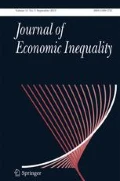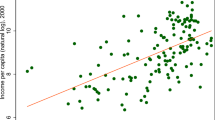Abstract
This paper discusses a research agenda that arises from unanswered questions and unresolved issues considered in the World Bank’s World Development Report 2006: Equity and Development. After formalizing the key concepts of equity; equality of opportunity; and efficiency, and proposing a definition for an equitable development policy, the paper discusses the concept of inequality traps, around which the research agenda is structured. Four broad groups of research questions are highlighted: those revolving around the measurement of inequality of opportunity and the diagnostics for the existence of an inequality trap; those dealing with the causes of inequality traps; the quantification of their efficiency costs; and those related to how institutions (including governments) evolve to overcome inequality traps.
Similar content being viewed by others
References
Acemoglu, D., Robinson, J.: Economic origins of dictatorship and democracy. Cambridge University Press, Cambridge, MA (2005)
Acemoglu, D., Johnson, S., Robinson, J.: The colonial origins of comparative development: an empirical investigation. Am. Econ. Rev. 91(5), 1369–1401 (2001)
Alesina, A., Angeletos, G.-M.: Fairness and redistribution. Am. Econ. Rev. 95(4), 960–980 (2005)
Angrist, J., Bettinger, E., Bloom, E., King, E., Kremer, M.: Vouchers for private schooling in Colombia: evidence from a randomized natural experiment. Am. Econ. Rev. 92(5), 1535–1558 (2002)
Appadurai, A.: The capacity to aspire: culture and the terms of recognition. In: Rao, V., Walton, M. (eds.) Culture and Public Action. Stanford University Press, Stanford, CA. (2004)
Araujo, M. Caridad, F., Francisco, L., Peter, Özler, B.: Local inequality and project choice: theory and evidence from Ecuador. World Bank Policy Research Working Paper Series #3997 (2006)
Arneson, R.: Equality of opportunity for welfare. Philos. Stud. 56, 77–93 (1989)
Atkinson, A.B., Stiglitz, J.E.: Lectures on Public Economics. McGraw-Hill, London (1980)
Attanasio, O., Meghir, C., Santiago, A.: Education choices in Mexico: using a structural model and a randomized experiment to evaluate progresa. University College London, Processed (2001)
Baiocchi, G., Chaudhuri, S., Heller, P.: Evaluating Empowerment: Participatory Budgeting in Brazil. World Bank, Washington, DC Processed (2005)
Baland, J.M., Platteau, J.P.: Wealth inequality and efficiency in the commons. Part I. The unregulated case. Oxf. Econ. Pap. 49(4), 451–482 (1997)
Baland, J.M., Platteau, J.P.: Wealth inequality and efficiency in the commons. Part II. The regulated case. Oxf. Econ. Pap. 50(1), 1–22 (1998)
Banerjee, A., Moohkerjee, D., Munshi, K., Ray, D.: Inequality, control rights, and rent seeking: sugar cooperatives in Maharastra. J. Polit. Econ. 109(1), 138–190 (2001)
Bardhan, P., Mookherjee, D.: Capture and governance at the local and national levels. AEA Papers and Proceedings 90(2), 135–139 (2000)
Bardhan, P., Mookherjee, D.: Decentralizing antipoverty program delivery in developing countries. J. Public Econ. 89, 675–704 (2005)
Bénabou, R.: Unequal societies: income distribution and the social contract. Am. Econ. Rev. 90(1), 96–129 (2000)
Bénabou, R., Tirole, J.: Belief in a just world and redistributive politics. Q. J. Econ. 121(2), 699–746 (2006)
Besley, T., Burgess, R.: The political economy of government responsiveness: theory and evidence from India. Q. J. Econ. 117(4), 1415–1451 (2002)
Besley, T., Coate, S.: Lobbying and welfare in a representative democracy. Rev. Econ. Stud. 68, 67–82 (2001)
Besley, T., Pande, R., Rahman, L., Rao, V.: The politics of public good provision: evidence from Indian local governments. Journal of the European Economic Association 2, 416–426 (2004)
Betts, J., Roemer, J.: Equalizing Opportunity through Educational Finance Reform. mimeo, Public Policy Institute of California, San Francisco, CA (1999)
Bourdieu, P.: The Logic of Practice. Stanford University Press, Stanford (1990)
Bourguignon, F., Verdier, T.: Oligarchy, democracy, inequality and growth. J. Dev. Econ. 62(2), 285–313 (2000)
Bourguignon, F., Ferreira, F., Leite, P.: Conditional cash transfers, schooling, and child-labor: micro-simulating Brazil’s Bolsa Escola program. World Bank Econ. Rev. 17(2), 229–254 (2003)
Bourguignon, F., Ferreira, F., Menéndez, M.: Inequality of outcomes and inequality of opportunities in Brazil. World Bank Policy Research Working Paper Series 3174 (2003)
Buchanan, J.M.: A Hobbesian interpretation of the Rawlsian difference principle. Kyklos 29(1), 5–25 (1976)
Chattopadhyay, R., Duflo, E.: Women as policy makers: evidence from a randomized policy experiment in India. Econometrica 72(5), 1409–1443 (2004)
Checchi, D., Peragine, V.: Regional disparities and inequality of opportunity: the case of Italy. IZA Discussion Paper No.1874 (2005)
Claessens, S., Perotti, E.: The links between finance and inequality: channels and evidence. Background paper for the WDR 2006 (2005)
Cohen, G.A.: On the currency of Egalitarian justice. Ethics 99, 906–944 (1989)
Dworkin, R.: What is equality? Part 2. Equality of resources. Philos. Public Aff. 10(3), 185–246 (1981)
Engerman, S., Sokoloff, K.: Factor endowments, inequality and paths of development among new world economies. Economía 3(1), 41–110 (2002)
Engerman, S., Sokoloff, K.: The evolution of suffrage institutions in the new world. J. Econ. Hist. 65(4), 891–921 (2005)
Ferreira, F.H.G. Education for the masses? The interaction between wealth, educational and political inequalities. Econ. Transit. 9(2), 533–552 (2001)
Galasso, E., Ravallion, M.: Decentralized targeting of an antipoverty program. J. Public Econ. 89, 705–727 (2005)
Grossman, G., Helpman, E.: Protection for sale. Am. Econ. Rev. 84(4), 833–850 (1994)
Haber, S., Kantor, S.: Getting Privatization Wrong: The Mexican Banking System, 1991–2003. Stanford University, Stanford, CA Processed (2004)
Haber, S., Maurer, N.: Related Lending and Economic Performance: Evidence from Mexico. Stanford University, Stanford, CA Processed (2004)
Heller, P.: The Labor of Development: Workers and the Transformation of Capitalism in Kerala, India. Cornell University Press, Ithaca, NY (1999)
Hoff, K.: Paths of Institutional Development: A institutional development: a view from economic history. World Bank Res. Obs. 18(2), 205–226 (2003)
Hoff, K., Pandey, P.: Belief systems and durable inequalities: an experimental investigation of Indian caste. Washington, D.C.: World Bank Policy Research Working Paper Series 2875 (2004)
Hoff, K., Pandey, P.: Economic consequences of social identity: discrimination, social identity and durable inequalities. AEA Papers and Proceedings, May 2006, 206–211 (2006)
Kanbur, R. (ed.): Qualitative and quantitative poverty appraisal: Complementarities, tensions and the way forward. Delhi: Permanent Black (2003)
Khan, B. Zorina, S., Kenneth L.: Patent institutions, industrial organization and early technological change: Britain and the United States. In: Berg, M., Bruland, K. (eds.) Technological Revolutions in Europe. Elgar, Cheltenham, UK (1998)
Krueger, A.O.: The political economy of the rent-seeking society. Am. Econ. Rev. 64(3): 291–303 (1974)
Nozick, R.: Anarchy, State and Utopy. New York: Basic (1974)
Piketty, T.: Social mobility and redistributive politics. Q. J. Econ. CX(3), 551–584 (1995)
Pistolesi, N., Lefranc, A., Trannoy, A.: Inequality of opportunities vs. inequality of outcomes: are Western societies all alike?. Mimeo, Université de Cergy-Pontoise (2005)
Rajan, R.G., Zingales, L.: Saving Capitalism from the Capitalists: Unleashing the Power of Financial Markets to Create Wealth and Spread Opportunity. Crown Business, New York (2003)
Rajan, R.G., Zingales, L.: The persistence of underdevelopment: institutions, human capital, or constituencies? National Bureau of Economic Research Working Paper 12093 (2006)
Rao, V.: On ‘inequality traps’ and development policy. Development Outreach, February, 10–13 (2006)
Rao, V., Woolcock, M.: Integrating qualitative and quantitative approaches in program evaluation. In: Bourguignon, François, Pereira Da Silva, Luiz (eds.) Tool Kit for Evaluating the Poverty and Distributional Impact of Economic Policies. World Bank, Washington, DC (2003, Oxford University Press)
Roemer, J.E.: Equality of Opportunity. Harvard University Press, Cambridge, MA (1998)
Roemer, J.E.: The 2006 World Development Report: equity and development – a review. Journal of Economic Inequality 4, 233–244 (2006).
Roemer, J.E., Aaberge, R., Colombino, U., Fritzell, J., Jenkins, S. P., Marx, I., Page, M., Pommer, E., Ruiz-Castillo J., Segundo, M.J.S., Traanes, T., Wagner, G., Zubiri, I.: To what extent do fiscal regimes equalize opportunities for income acquisition among citizens? J. Public Econ. 87, 539–565 (2003)
Sen, A.: Equality of what? In: McMurrin S. (ed.) Tanner Lectures on Human Values. Cambridge University Press, Cambridge, MA (1980)
Sen, A.: Commodities and Capabilities. North Holland, Amsterdam (1985)
Steele, C.M.: Thin ice: ‘stereotype threat’ and black college students. Atl. Mon. 284(2), 44–54 (1999)
Tendler, J.: Good government in the tropics. Johns Hopkins University Press, Baltimore (1997)
Thirumurthy, H., Zivin, J., Goldstein, M.: The economic impact of aids treatment: labor supply in Western Kenya. World Bank.(2006, Processed)
Todd, P.E., Wolpin, K.I.: Ex-ante evaluation of social programs. University of Pennsylvania (2005, Processed)
Van de Gaer, D., Schokkaert, E., Martínez, M.: Three meanings of intergenerational mobility. Economica 68, 519–537 (2001)
World Bank: World Development Report 2006: Equity and Development. World Bank, Washington, DC (2005, Oxford University Press)
Author information
Authors and Affiliations
Corresponding author
Additional information
Bourguignon and Ferreira are in the Development Economics Vice-Presidency, The World Bank. Michael Walton is at the John F. Kennedy School of Government, Harvard University. Together, they led the team that produced the World Bank’s World Development Report 2006: Equity and Development.
Rights and permissions
About this article
Cite this article
Bourguignon, F., Ferreira, F.H.G. & Walton, M. Equity, efficiency and inequality traps: A research agenda. J Econ Inequal 5, 235–256 (2007). https://doi.org/10.1007/s10888-006-9042-8
Published:
Issue Date:
DOI: https://doi.org/10.1007/s10888-006-9042-8




